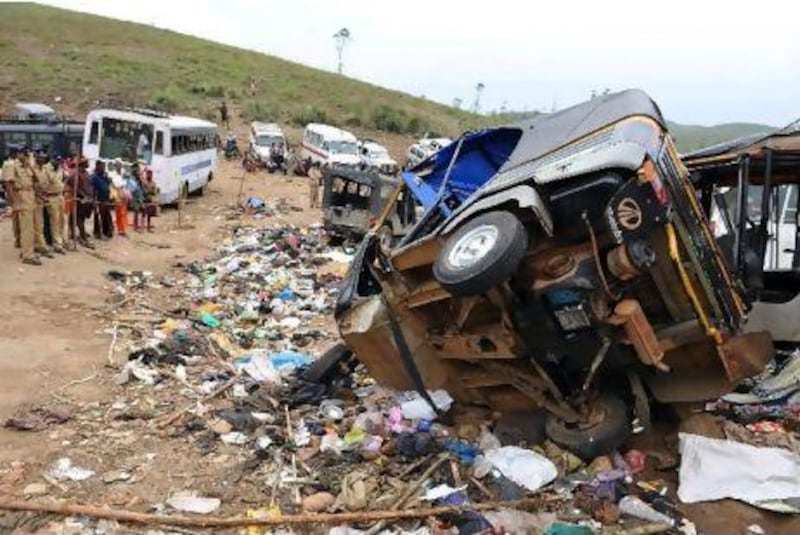NEW DELHI // On a steep, narrow path near the Hindu temple of Sabarimala, in the southern Indian state of Kerala, a nighttime road accident sparked a stampede of pilgrims, leading to the death of 104 people. Dozens more were injured.
The stampede occurred on Friday, the final night of Sabarimala's two-month pilgrimage season, which draws hundreds of thousands of devotees every year. Of the 104 victims, just over half had been identified by yesterday evening. The casualties included at least five children.
After night had fallen on Friday, pilgrims were returning by vehicle and on foot on the poorly lit path.
According to news reports, a jeep lost control, ploughed into another vehicle, and overturned. "The accident caused a mass panic and triggered a stampede on the hillside," said Rajendra Nair, the special police commissioner.
AK Antony, the defence minister, called the incident "a tragedy beyond anyone's imagination" and said local military units had been put on standby if needed. The Indian prime minister, Manmohan Singh, pledged up to 100,000 rupees (Dh8,080) compensation to each of the families of those killed, the Press Trust of Indiareported.
Manoj Kutty, 33, was returning from Sabarimala after participating in a ritual lamp lighting ceremony and evening prayers at the temple complex when the stampede occurred. "People were rushing downhill, and we could see people fall down and others fall over them. It all happened in seconds," Mr Kutty said.
The terrain made it particularly difficult for rescue workers to reach the scene of the stampede. Police and ambulance vehicles had to swim against a tide of pilgrims flowing in the opposite direction, and crowds similarly held up vehicles bound for hospitals in the nearby town of Kumili.
Thomas Isaac, Kerala's finance minister, said police had scoured the forest area near the stampede site and did not expect to find any more bodies. "So far 56 bodies have been identified. Our priority now is to identify the rest of the bodies and hand them over to the families of the victims," he said.
Deadly stampedes are relatively common at temples in India, where large crowds - sometimes hundreds of thousands of people - gather in tiny areas with no safety measures or crowd control.
In March, 63 people were killed when poor villagers scrambled for free food and clothing being given away at a ceremony at a temple in the northern state of Uttar Pradesh. In 2008, more than 145 people died in a stampede at a remote Hindu temple at the foothills of the Himalayas.
Sabarimala's itself has suffered previous tragedies. In 1999, a stampede similar to Friday's caused 52 deaths. An investigation into the deaths found the state government guilty of negligence in ensuring public safety. Even a week ago, a pilgrim from Andhra Pradesh died in a small stampede, after a rope directing the devotees snapped.
The path on which this particular stampede occurred is ordinarily closed to the public. But during Sabarimala's pilgrimage season, as the two other main routes become rapidly congested with people and vehicles, the path is opened briefly. State and temple authorities have, however, been unable to install the security and lighting measures that the path requires.
V Surendran Pillai, a member of Kerala's cabinet of ministers, told The Hindu newspaper that it would be "difficult for us to put permanent arrangements - whether lighting or other facilities - in place because we would have to get the permission of the [central government], this being a reserve forest."
Access paths to Sabarimala and other pilgrimage spots in India are commonly choked, unable to handle the deluge of devotees that descend upon them every season. A few days before this stampede, the main road leading up to Sabarimala witnessed a 45km-long traffic jam, as police attempted to regulate the huge numbers of pilgrims entering the area.





